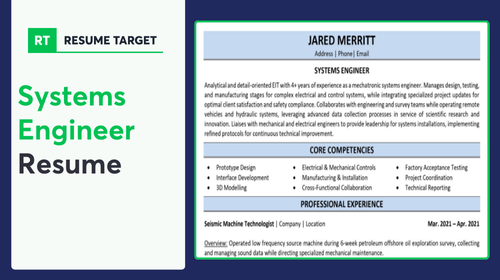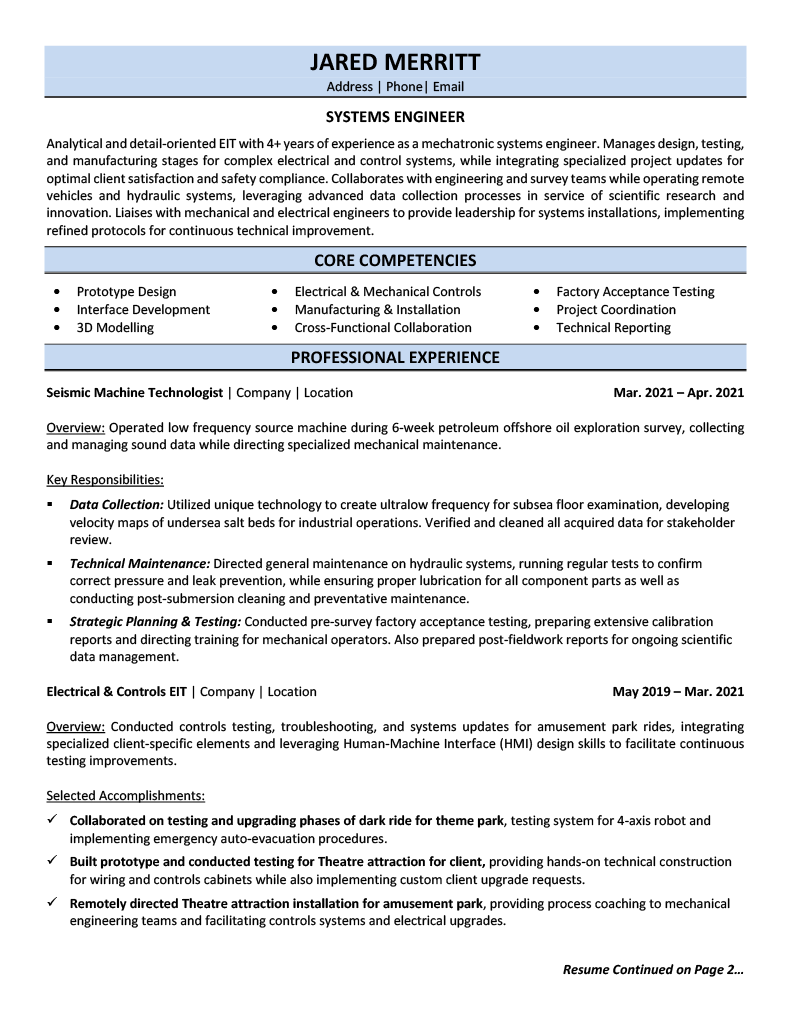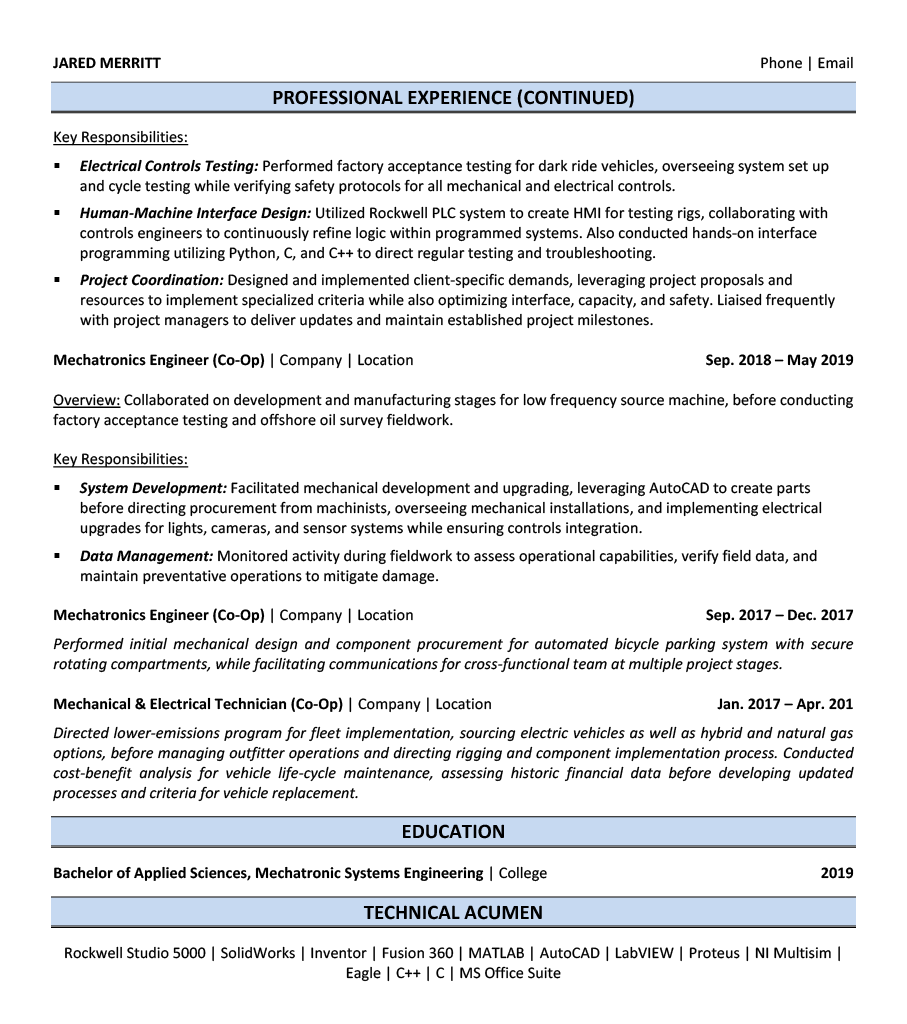

Technical expertise alone won't get you noticed in today's competitive systems engineering market. Your resume needs to translate complex achievements into business value that hiring managers understand.
Are you struggling to showcase both your technical depth and leadership abilities on paper? A strategically crafted resume can bridge the gap between your engineering capabilities and the bottom-line results employers want to see.
Resume Target specializes in helping Systems Engineers communicate their impact clearly and powerfully. This guide will show you exactly how to transform your technical experience into a compelling narrative that lands more interviews.


At the intersection of technology, business, and problem-solving, Systems Engineers serve as the master architects who take a holistic view of organizational systems, ensuring that complex operations run like well-oiled machines.
In this dynamic role, you'll find yourself analyzing intricate systems, coordinating with cross-functional teams, and implementing solutions that transform inefficient processes into streamlined operations that drive business success.
Whether you're just starting out or looking to advance your career, the systems engineering field offers diverse opportunities for growth, from specialized technical roles to leadership positions like Chief Systems Engineer, making it an exciting path for problem-solvers who love seeing the big picture.
Let's talk about what makes Systems Engineering such an exciting career path right now! Your earning potential as a Systems Engineer can be impressive, especially as you gain expertise in specialized areas like software development, networking, or product development. And guess what? When you factor in additional compensation and bonuses, your total earnings package becomes even more attractive.
Figures from: Leftronic
Systems Engineers can advance from junior roles to executive positions through strategic skill development and experience. Your path can lead from hands-on technical work to managing enterprise-wide systems and teams.
Beyond basic technical knowledge, advancing in systems engineering requires a powerful combination of specialized expertise and leadership capabilities.
- Systems architecture and integration - Advanced requirements engineering - Project management certification - Strategic communication and team leadershipBreaking into Systems Engineering typically starts with gaining hands-on experience in software development, hardware engineering, or technical project coordination roles while building your systems thinking capabilities.
To build your foundation for a Systems Engineering career, you'll need to develop both technical expertise and strong analytical skills through progressive experience in related technical roles.
• Junior Software Developer • Technical Support Engineer • Hardware Engineer • Project Coordinator • Quality Assurance Engineer • Integration Specialist • Junior Requirements Analyst • Technical Documentation SpecialistRequirements from Teal HQ
From manufacturing hubs to tech corridors, Systems Engineers are in high demand across both coasts and emerging tech centers.
Figures from Zippia
Struggling to translate your complex technical projects and system implementations into a clear, compelling resume that hiring managers will actually understand? This comprehensive, section-by-section guide will help you craft a systems engineer resume that effectively showcases your technical expertise, project successes, and problem-solving abilities.
As a Systems Engineer, you know how to optimize complex technical processes, but condensing your impressive career into a few powerful sentences can feel like debugging an entirely new kind of system.
While you excel at integrating multiple technologies and managing cross-functional projects, translating these high-level technical abilities into compelling resume language that catches a hiring manager's attention requires a strategic approach that showcases both your technical expertise and business impact.
How would you describe your unique blend of technical expertise across systems architecture, integration, and engineering methodologies that sets you apart from other Systems Engineers?
Reason: This helps establish your professional identity and technical foundation while highlighting what makes you distinctive in the field of systems engineering. It forces you to think about your comprehensive skill set rather than individual accomplishments.
What is your overarching approach to managing complex systems lifecycles and how does it reflect your philosophy as a Systems Engineer?
Reason: This question helps articulate your professional methodology and thought process, giving potential employers insight into how you tackle large-scale systems challenges holistically.
How do you bridge the gap between technical requirements and business objectives when leading cross-functional engineering initiatives?
Reason: This helps showcase your ability to translate complex technical concepts into business value, which is a crucial skill for Systems Engineers who must often serve as a bridge between technical teams and stakeholders.
As a Systems Engineer, you need to showcase both your technical expertise in systems architecture and integration as well as your ability to manage complex projects and collaborate across teams.
Your skills section should balance high-level capabilities like systems design and requirements analysis with specific technical competencies such as programming languages, modeling tools, and industry-standard frameworks like TOGAF or INCOSE.
Showcase your technical expertise and project success by organizing your systems engineering experience into three powerful sections: a high-level role overview that sets the stage, measurable achievements that demonstrate your impact, and core responsibilities that highlight your technical and collaborative capabilities.
Many Systems Engineers struggle to translate their complex technical solutions and cross-functional leadership into compelling resume achievements. Transform your technical expertise into powerful success stories by connecting your system optimizations, integrations, and architectural improvements to measurable business impacts like cost savings, efficiency gains, and reduced downtime.
The responsibilities section demonstrates how Systems Engineers integrate complex technical solutions while managing stakeholder needs. This section should translate technical achievements into business value, showing how your work supports organizational goals and improves system efficiency.
Your technical credentials demonstrate your expertise in systems architecture, network infrastructure, and enterprise solutions. Lead with your most current certifications and advanced degrees, especially those focused on cloud platforms, systems integration, or specialized engineering disciplines.
Now that you've built a strong foundation using Resume Target's proven resume writing guidelines, you're ready to transform your resume into a powerful tool for landing systems engineering positions.
While many candidates stop at customizing their cover letter, successful systems engineers know that personalizing their resume for each specific role is what sets them apart in this competitive technical field.
By strategically incorporating relevant keywords and highlighting specific systems engineering skills that match each job description, your resume will not only sail through ATS screenings but will also immediately show hiring managers that you're the solution to their technical needs.
Ready to turn your resume into your secret weapon? Let's make every word count and show employers you're the systems engineer they've been searching for!
Don't let a lack of professional experience hold you back from launching your Systems Engineer career! Your technical knowledge, academic achievements, and hands-on projects can create a compelling story that showcases your potential.
Focus on highlighting your technical skills, relevant coursework, and any systems-related projects or internships you've completed.
The key elements to emphasize are your programming languages, system design knowledge, and problem-solving capabilities - check out the Student Resume Writing Guide to learn how to present these effectively.
Your resume summary is your chance to showcase how your technical education, project work, and any internship experience have prepared you for a systems engineering role.
Focus on highlighting your analytical skills, programming knowledge, and system design capabilities to demonstrate your readiness to contribute from day one.
"Detail-oriented and methodical Systems Engineer with comprehensive academic training and hands-on project experience in systems integration and software development. Proficient in Python, Java, and system architecture design, with demonstrated success leading three cross-functional student engineering projects. Completed internship at regional tech firm optimizing network performance by 25%. Seeking to leverage strong analytical and problem-solving abilities to drive system efficiency and reliability improvements as a Systems Engineer."
Now's your chance to showcase the technical foundation and specialized knowledge that makes you a standout Systems Engineer candidate!
Transform your academic experience into compelling content by highlighting relevant coursework like "Systems Architecture"or "Requirements Engineering,"along with hands-on projects that demonstrate your ability to design and optimize complex systems.
Insufficient data available despite thorough search.Relevant Coursework: Systems Architecture | Software Engineering Principles | Network Infrastructure | Database Management Systems | Control Systems Design | Systems Integration & Testing
Key Projects:
Enterprise Resource Planning (ERP) System Integration: Developed and implemented a scaled-down ERP system prototype to streamline business processes and enhance data flow between departments.
Network Optimization Project: Collaborated with a four-person team to analyze and improve network performance for a simulated enterprise environment.
Leverage your academic training, technical certifications, and hands-on project experience to create a compelling skills section that showcases your readiness to tackle complex systems integration and optimization challenges.
As an entry-level Systems Engineer, your combination of technical knowledge and analytical capabilities positions you well for roles where you'll help organizations design, implement, and maintain critical systems infrastructure, with excellent growth potential in this ever-expanding field.
When you're juggling multiple technical frameworks, methodologies, and cross-functional achievements, it can feel impossible to package your complex systems expertise into a clear, compelling resume that non-technical hiring managers will understand.
At Resume Target, we specialize in translating intricate systems engineering accomplishments into powerful career narratives that resonate with both technical and non-technical decision makers.
Our expert writers have helped countless systems engineers showcase their unique blend of technical architecture, project management, and cross-functional leadership skills in ways that consistently land interviews.
With major digital transformation initiatives ramping up across industries, now is the perfect time to ensure your systems engineering expertise shines through - let's connect today for a free resume review that will show you exactly how to stand out.
Impress any hiring manager with our Engineering resume writing service. We work with all career levels and types of Engineering professionals.
Learn More → Engineering Resume Writing Services